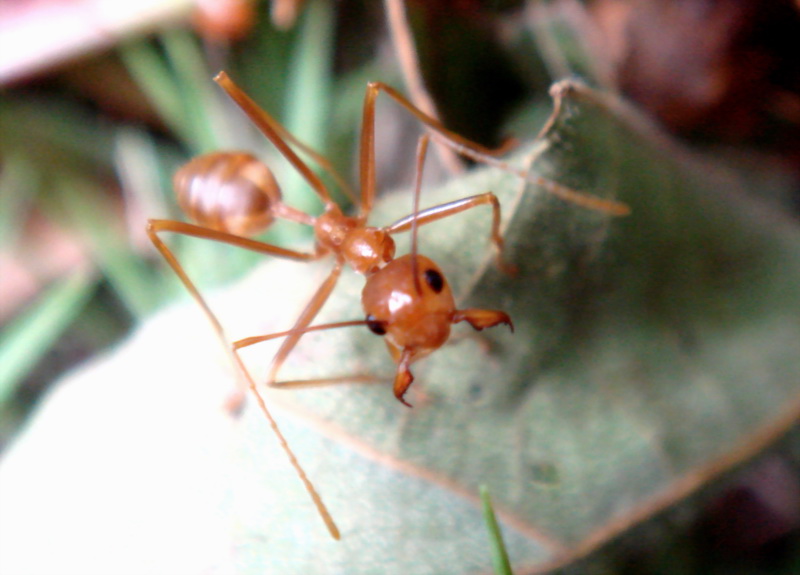|
Weaver Ants (Family: Formicidae, Genus: Oecophylla) - Wiki
| 제목: | Weaver Ants (Family: Formicidae, Genus: Oecophylla) - Wiki
| |

| 해상도: 800x575
파일크기: 106521 Bytes
촬영일: 2006:12:29 16:34:38
사진기: DSC-T10 (SONY)
F number: f/3.5
Exposure: 10/300 sec
Focal Length: 633/100
등록시간: 2007:11:21 14:06:30
|
Weaver ant
From Wikipedia, the free encyclopedia
Order: Hymenoptera
Family: Formicidae
Species: Oecophylla longinoda, Oecophylla smaragdina
[Photo] A weaver ant in combat position. Pamalican. Philippines. Personal photograph 2006. Author: PHGCOM. Date: 29 December 2006. | Permission is granted to copy, distribute and/or modify this document under the terms of the GNU Free Documentation License, Version 1.2 or any later version published by the Free Software Foundation; with no Invariant Sections, no Front-Cover Texts, and no Back-Cover Texts. A copy of the license is included in the section entitled "GNU Free Documentation License". |
Weaver ants or Green ants (genus Oecophylla) are social insects belonging to the ant family, known for their communication and nest building behaviour. Weaver ants are social insects that have complex bio-chemical communication and make elaborate nests out of living tree-leaves. Weaver ants are found in the tropical forests of Africa, Australia and southeast Asia. They may be colored a shade of red, although those found in North Queensland, Australia, are yellow-brown, with a bright green bulb at the tail, hence the common name "Green Tree Ant". This species is known for its painful, irritating bite.
Taxonomy
The Weaver ants belongs to the ant genus Oecophylla (subfamily Formicinae) which consists of only two extant species; O. longinoda and O. smaragdina. Oecophylla smaragdina is found in the tropical coastal areas in Australia as far south as Rockhampton and across the coastal tropics of the Northern Territory down to Broome in West Australia.
The common features of the genus include an elongated first funicular segment, presence of propodeal lobes, helcium at midheight of abdominal segment 3 and gaster capable of reflexion over the mesosoma. Males have vestigial pretarsal claws.
Complex communication in nest building
Weaver ants form the most elaborate communicative organization in the insect world. They form complex organizations through their simple intelligence to emerge as an elaborate social structure. At first the queen ant lays her eggs among tree leaves while the worker ants engage in building the nest. This emergent ant society helps in building the nest by weaving together living tree leaves. This is done by first forming ant chains that hold together leaves and then manipulating the ant larva to produce silk in order to glue the tree leaves. Thus the ant colony emerges with the queen in the centre of the nest whose only purpose is to lay eggs while female ants engage in building the nest. The entire nest building activity is a very distributed process involving every ant.
A mature colony of weaver ants can hold as many as 100,000 to 500,000 workers and may span as many as 12 trees and contain as many as 150 nests. Weaver ant colonies have one queen and a colony can live for up to eight years. Minor workers usually remain within the egg chambers of the nest tending the larvae, whereas major workers defend the colony territory, assist with the care of the queen and forage.
Emergent ant organization and artificial intelligence
The emergence of complex organization among weaver ants, from simple biological intelligence is a model for social communication processes in organizations and artificial intelligence. It is extensively modeled and studied in the emergence of complex behavior from simple rules in diverse disciplines of generative sciences. The weaver ants emergent organization and eating behaviour is applied as natural bio-control of pests in orchards, where they are introduced on trees in order to build nests and act as natural pest control.
http://en.wikipedia.org/wiki/Weaver_ant
| The text in this page is based on the copyrighted Wikipedia article shown in above URL. It is used under the GNU Free Documentation License. You may redistribute it, verbatim or modified, providing that you comply with the terms of the GFDL. |
|
^o^
동물그림창고 똑똑전화 누리집
^o^
|
|

